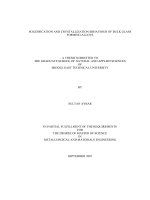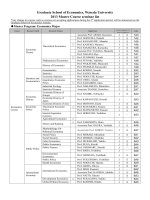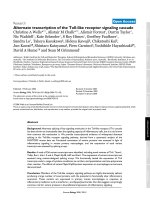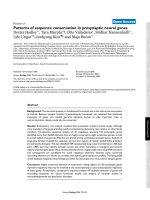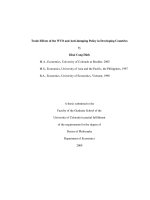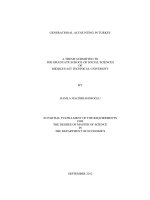ÇANKAYA UNIVERSITY GRADUATE SCHOOL OF NATURAL AND APPLIED SCIENCES
Bạn đang xem bản rút gọn của tài liệu. Xem và tải ngay bản đầy đủ của tài liệu tại đây (122.42 KB, 21 trang )
ÇANKAYA UNIVERSITY
GRADUATE SCHOOL OF NATURAL AND
APPLIED SCIENCES
THESIS MANUAL
CHAPTER 1
GENERAL POLICIES
1.1 INTRODUCTION
The purpose of these guidelines is to ensure that every thesis which is to carry the
name of Çankaya University meets the same high standards of presentation. These
standards are the standards of the Graduate School of Natural and Applied Sciences
and are applied consistently in all departments and programs.
For all cases not covered by the guidelines given in this manual, please obtain the
written approval of the Graduate School concerned before presenting the thesis.
1 .2 CLASSIFIED MATERIAL
Because all theses are made available to the public, a thesis containing classified
material cannot be accepted.
1 .3 THESIS CONTAINING POTENTIALLY PATENTABLE INFORMATION
If your theses contains potentially patentable information, you may request a 90-day
hold on the release of your thesis to the public. During this period, the Graduate School
will not release your thesis to the public. The hold period begins immediately after the
official graduation date.
1.4 REFERENCING THE PREVIOUS WORK OF OTHERS AND PLAGIARISM
In academic writing, referring to works of other authors is a requirement of academic
integrity. Referencing is a matter of honesty and crediting others for their previous ideas
and work; but it is also a matter of credibility of your work, in other words, an evidence
of the fact that you are aware of what was done on the topic you have been dealing with
in your thesis.
Using ideas and research findings of others, and yet pretending that they are your own
is plagiarism, which is not only unethical and immoral but also a crime. Therefore,
great care must be given to using a proper style in writing your manuscript so that your
original work and work of others are clearly distinguishable without any ambiguity, and
that all ideas and work of others used in your study are meticulously referenced.
CHAPTER 2
FORMAT AND APPEARANCE
2.1 PAPER AND DUPLICATION
To insure durability all copies must be on good quality white A4 paper. Only single-sided
copies will be accepted. Submission of the original copy is not required. Photocopies
must be made from the original, and all pages must have high contrast with consistently
black print throughout the thesis. The print must be permanent; it must not smudge. All
pages must be copied onto acceptable paper, as described above.
2.2 TYPE
The type size should be 10-12 point. Any standard font is acceptable. Do not use script,
or ornamental fonts. The typeface and size must be consistent throughout the thesis.
Bold face letters and symbols, and italics may be used for special emphasis and foreign
words.
In the body of the thesis, different typefaces and sizes may be used to set chapter titles,
section headings, footnotes, endnotes, examples, quotations, tables, and charts from
the rest of the text, as long as they are easily readable.
No ink corrections, strikeovers, correction fluid or tape, paste-ups, insertions between
lines, and letraset are permitted on the final bound copies. If you must make corrections,
do them on the original manuscript before it is copied.
2.3 SPACING
The general text of the manuscript must use either double or one and one-half line
spacing. Tables, long quotations, footnotes, endnotes, bibliographies, and captions may
be single-spaced.
2.4 MARGINS
The left margin (binding side) must be at least 4 cm wide to allow for binding; the other
three margins must be at least 2.5 cm wide. Narrower margins are not acceptable.
Slightly larger margins are advisable, to allow for error during reproduction. Absolutely
nothing must appear in the margins. This means that all headings, page numbers,
text, tables, illustrations, etc., must be contained completely within the area bounded by
the margins. Full justification is recommended.
2.5 CENTERING
All materials must be centered between the text margins rather than between paper
edges. After the manuscript is bound, centered material will appear to be centered on
the page.
2.6 WORD AND TEXT DIVISIONS
Words must be divided correctly at the end of a line and may not be divided from one
page to the next. Use a standard dictionary to determine word hyphenation. At least two
lines of a paragraph must appear together at the top and bottom of every page. A
subheading must be followed by at least 2 lines of a paragraph.
2.7 PAGINATION
AlI page numbers of the thesis or dissertation must appear in the same location on the
page. You have two choices for this location: bottom center or bottom right of the page.
In any case, page numbers must be at least two single spaces below the nearest line of
text, but within the margin boundaries as stated above. All page numbers must be in the
same font and size of the text.
The following pagination plan should be used:
a) For the preliminary pages, use small Roman Numerals (i, ii, iii, iv, etc.). The title page
and the approval page do not have numbers but count as actual page, and the
numbering should begin with iii on the statement of non-plagiarism page.
b) Use Arabic numerals beginning with "1" on the first page of the text and continue
throughout the rest of the thesis, including bibliography, appendices, and curriculum
vitae. All pages must be numbered consecutively, including pages containing
chapter pages, illustrations, such as tables, figures, plates, and photographs.
2.8 MULTIPLE VOLUMES
If your finished manuscript exceeds 5 cm in thickness it must be bound in two or more
volumes. Volumes are numbered consecutively, using capital Roman numerals. Each
additional volume must contain a title page. Title pages are identical except for the
notation Volume I, Volume II, etc., just below the title to differentiate the volumes.
Both the Roman and the Arabic numbering systems begun in Volume I should continue
through Volume II. As with the title page of Volume I, that of Volume II is counted among
the preliminary pages but does not bear a number. If iv is the last Roman numeral used
in Volume I, for example, the title page of the second volume will count as page v and
will be followed by preliminary pages vi, vii, etc. Each volume contains the Table of
Contents.
2.9 BINDING
All master's theses are to be bound in black cloth. All doctoral theses are to be bound in
red cloth. Synthetic, leatherette, or similar cloths are not acceptable. A bound copy of
the thesis should measure 21.5 by 28.5 cm.
See Appendix A for the front cover and the spine.
CHAPTER 3
SPECIFIC GUIDELINES FOR THE PARTS OF THE THESIS
Two general rules of thumb should govern the presentation of any thesis: keep the
format as simple as possible, and be consistent with the format throughout the thesis.
Every thesis has three main parts or divisions: the preliminary pages, the main body and
the reference matter. You must follow the order of items within these parts as listed
below. Required sections are marked with an asterisk. Further instruction about each
section follows this list.
PRELIMINARY PAGES
* Title Page
* Approval Page
* Abstract
* Öz
Acknowledgments
Preface
* Table of Contents
List of Tables
List of Figures
List of Illustrations
List of Symbols and/or Abbreviations
* MAIN BODY
REFERENCE MATTER
* Bibliography or References
Appendices
* Curriculum Vitae (required only of doctoral candidates)
3.1 PRELIMINARY PAGES
3.1.1 Title Page
The title must be single-spaced, all in capital letters, and should begin at 5 cm from the
top of the page. The information retrieval systems consulted by many scholars to locate
theses and dissertations relating to their own work use the key words in the title.
Consequently, the title must not contain chemical or mathematical formulas,
symbols, superscripts, subscripts, Greek letters, or other non-standard
abbreviations and characters; words must be substituted for all these.
The format of the title page, including spacing and capitalization, must be exactly as in
the sample title page shown in Appendix B.
3.1.2 Approval Page
A sample approval page is provided in Appendix C. It is strongly recommended that the
approval page of the thesis be signed in blue ink.
3.1.3. Statement of Nonplagiarism Page
This page includes the statement signed by the author about plagiarism. A sample
plagiarism page is provided in Appendix D.
3.1.4 Abstract
The abstract gives a succinct account of the thesis or dissertation, including a statement
of the problem, procedure and methods, results, conclusions. It must not exceed 250
words, must not include diagrams, and should not include mathematical formulas unless
essential.
A sample abstract page is provided in Appendix E.
3.1.5 Öz
Öz is the Turkish translation of the abstract. A sample Öz is provided in Appendix F.
3.1.6 Acknowledgments And Preface
Acknowledgments and preface are optional. They must have headings and should use
the same spacing as in the main body (i.e., double spacing or one space and a half). The
heading ACKNOWLEDGMENTS or PREFACE appears centered between the text
margins without punctuation 5 cm from the top of the page; text begins at least three
line spaces below the heading.
A sample acknowledgments page is provided in Appendix G.
3.1.7 Table of Contents
The table of contents must list the title of each chapter and its parts and sections,
references or bibliography, appendices, and curriculum vitae (if applicable). The wording
used for all entries in the table of contents must match exactly with what is used in the
text. Each entry must have leading dots which connect it to its corresponding page
number.
The heading TABLE OF CONTENTS appears without punctuation centered between the
text margins 5 cm from the top of the page. The listing of actual contents begins at the
left margin at least three line spaces below the heading.
A sample table of contents page is provided in Appendix H.
3.1.8 List of Tables
A list of tables should be included for the convenience of the reader if the main body
contains tables. If included, it will immediately follow the table of contents on a new
page.
The heading LIST OF TABLES appears centered between the text margins without
punctuation 5 cm from the top of the page; the listing begins at the left margin at least
three line spaces below the heading.
Each entry should have the same number and the same caption or title used for a table
in the text, although a long caption may be abbreviated to the extent of using only the
first full sentence. As in the table of contents, each entry must have leading dots which
connect it to its page number.
A sample list of tables is provided in Appendix I.
3.1.9 List of Figures or List of Illustrations
If included, these lists must appear on separate pages and are governed by the same
rules as the list of tables. A sample List of Figures is provided in Appendix J.
3.1.10 List of Symbols And/or Abbreviations
If included, you should follow a format consistent with acceptable practices in your
discipline.
3.2 THE MAIN BODY
The main body of a thesis, is divided into multiple chapters to help the reader in
understanding the subject matter. Although the detailed organization of the text varies
among academic disciplines, the formatting of the text must be consistent throughout.
All headings and subheadings should be presented in the same way in each
chapter, in terms of capitalization, placement on the page and kind of type
used. No headers, giving the titles of chapters or other sections, are allowed at the top
of the pages.
Chapters are numbered consecutively in Arabic or Roman numerals and capital letters
(CHAPTER I, CHAPTER 2, etc., or CHAPTER I, CHAPTER II, etc.). In addition to general
titles like INTRODUCTION, the chapters need substantially descriptive titles as well.
Only chapters should begin with a new page. Within a chapter, the presentation of
subsections must be continuous: partially filled pages of text are acceptable only on
non-textual pages, such as those presenting tables and illustrations.
The heading CHAPTER I in all capitals is centered between the text margins 5 cm from
the top of the page; the title goes two line spaces below. The text begins at least three
line spaces below.
In many cases, the main body of the thesis will include certain materials other than
ordinary text, such as illustrations, formulas, quotations, footnotes, and endnotes. In
such cases, the following guidelines should be observed.
3.2.1 Illustrative Material
Illustrations include drawings, charts, figures, tables, diagrams, plates and photographs.
These may be inserted wherever the author feels appropriate, but as a general rule,
they should appear as near as possible to the part of the text relating to them.
Illustrations of one-half page or less in length may appear on the same page with the
text, separated from the text above and below by triple line spacing illustrations longer
than one-half page are better placed on a separate sheet.
Illustrations that are too large to be placed sideways between the left- and right-hand
margins should be rotated counterclockwise 90 degrees so that the top of the illustration
runs parallel to the left-hand margin of the page.
The caption or legend for such an illustration must also be rotated. When illustrations
are presented in this manner, the usual margin requirements remain in effect, and page
numbers should appear in their normal place.
Illustrations of any kind must be numbered consecutively. This includes
appendices, if you have them. You may follow a straight sequence (1, 2, 3, ete.) or
use a decimal approach (1.1, 1.2, 1.3, ete., A.1, A.2, A.3, ete.) where the first digit is the
chapter or appendix number, and the digit after the decimal point is the illustration
number) .
Illustrations may run longer than one page. In such cases all subsequent pages of the
illustration must include at least the illustration number and the notation that it is
continued, e.g., "Table 1 (cont.)" or "Table 1(continued)."
All headings and captions must be prepared either in the same typeface and point size
used for the text, or in the same typeface and point size as every other heading and
caption. Choose a point size that can be read easily, especially for tables.
Table numbers and captions are placed one space above the top line of the illustration
figure numbers and captions are placed one space below the last line of the illustration.
Authors may treat oversized materials in one of the following three ways:
a) Captions may be placed on a separate page, facing the illustration. Consequently, it is
the right margin of a facing page, not the left, that must be at least 4 cm for binding
purposes. If an oversized illustration is rotated and the caption appears on a facing
page, the caption must also be rotated.
b) An illustration may be photo-reduced, but its page number and caption must be the
same size and typeface as in the rest of the illustrations.
c) An illustration may be folded and inserted in either of the following ways:
i) Fold the illustration and insert it in a white or manila envelope no larger than 16.5 by
24 cm, which may be mounted on paper of the proper weight for inclusion in the thesis.
Each page enclosed in the envelope must be included in the pagination of the thesis; the
page on which the envelope is mounted should have a single page number or inclusive
page numbers, as needed.
ii) Fold the illustration and mount it on 21 by 29.7 cm sheet ( A-4).
3.2.2 Formulas
Mathematical and chemical formulas, equations and expressions should be printed. If
reference is made to them, they must carry numerical identification.
3.2.3 Quotations
Direct prose quotations of three typewritten lines or less should be incorporated into the
text, enclosed in double quotation marks. Prose quotations which exceed three lines
should be set off from the text in single spacing and indented in its entirety at least four
spaces from the left margin, with no quotation marks at beginning or end.
3.2.4 Footnotes and Endnotes
Notes may be in the form of footnotes, placed at the bottom of each page, or endnotes,
placed at the end of each chapter or at the end of the thesis before the bibliography.
Footnotes and endnotes should be single-space within, and double-space between, each
listing. If placed at the bottom of each page, footnotes must be separated from the text
by a complete horizontal line one space above the first line of the foot note and must be
written using a smaller font size.
Arabic numerals, asterisks or small letters should be used for footnotes and endnotes. In
either case, the label used may appear either above the line or in paranthesis even with
the line.
3.3 LIST OF REFERENCES
The reference material consists of a bibliography or references, which is required, and
appendices, which are optional.
3.3.1 References
1- References are given with the pages numbered in the order of R1, R2, R3,…. and in
alphabetical order. All references including books, articles, lectures, web sites etc. are to
be given in the bibliography. If the author is not indicated, the name of the affiliated
organization should be given.
Format of references:
A. Books:
a. one author
ALLPORT, G.W. (1973), Pattern and Growth in Personality, Holt, Reinhardt Winston, New
York.
b. two authors
Ogden, C.K., RICHARDS, I.A.(1923), The Meaning of Meaning, Harcourt Brace, New
York.
c. more than three authors
DUTCHER, G.M. et. al. (1931), Guide to Historical Literature, Macmillan New York.
d. no author
The lottery (1923), J.Watts, London.
e. translation
BILLINGTON, D.P. (1965), Concrete Shell Structures, Betonarme Kabuk Yapılar, trans. H.
Kabataş and M.Pultar (1975) İTÜ Mimarlık Fakültesi Yayınları, İstanbul.
f. edited works
YAVUZ , E., UUREL, ĩ.N. Eds. (1984), Tarih ỗinde Ankara, Seminer Bildileri (28-30
Eylül 1981) Mimarlık Fakültesi, ODTÜ, Ankara.
g. published or written by an organization
DİE (1972), 1970 Binalar Sayımı, yayın no.647 Devlet İstatistik Enstitüsü Matbaası,
Ankara.
h. article in edited book
YAVUZ Y. (1984), 1923-1928 Ankara’sında Konut Sorunu ve Konut Gelimesi, Tarih
ỗinde Ankara, Seminer Bildirileri (28-30 Eylỹl 1981) Eds.E. Yavuz, Ü.N. Uğurel, Mimarlık
Fakültesi, ODTÜ, Ankara 235-256.
ı. BRONTON, P. (1969), Behavior, Body Mechanics and Discomfort, Sitting Posture, ed.
E.Grandjean, Taylor and Francis, London, 315-332.
i. reports
STONE, P.T.,THOMSON, G.S. (1970), Seating for Motor Vehicles, Report no: MVR-3,
Loughborough College of Technology, Loughborough.
j. theses
FRIEDMAN,S.M. (1969), Relationship Between Cognitive Complexity, Interpersonal
Dimensions and Spatial Preferences and Properties, unpublished Ph.D.Dissertation,
University of California, Berkeley.
BEKTÖRE, İ.S. (1986), Formation of Apartment Blocks in Squatter Areas as a Distinct
Aspect of Unauthorized Urban Housing Stock, yayımlanmamış Yüksek Lisans Tezi, Şehir
ve Bölge Planlama Bölümü, ODTÜ, Ankara.
B. Periodicals:
standard
BARAKAT, H. (1969) A Process of Encounter between Utopia and Reality, The British
Journal of Sociology, 1-10. Vol. 20.
2- Do not give the list of references a chapter number, but it must have page numbers
written in the same typeface and size used for pagination throughout the thesis.
3- The heading list of references is centered between the text margins without
punctuation
5 cm from the top of the page; the list begins four spaces below.
4- Each reference entry should be single-spaced with double spacing between entries.
3.3.2 Appendices
Some authors may desire to include certain materials of the thesis in an appendix rather
than in the main body. For example, an appendix may contain test forms, detailed
apparatus description, extensive tables of raw data, computer programs, etc.
a) If the information to be appended requires more than one appendix, each should be
given a letter (Appendix A, Appendix B, etc.). The heading APPENDIX A should appear
centered between the text margins 5 cm from the top of the page. The typeface and size
should be those used for chapter titles.
b) Spacing need not be the same for each of the appendices. Documents and case
studies may be single-spaced, whereas spacing for the explanations of methods and
procedures may be similar to that of the main body.
c) Each appendix with its title must be listed separately in the table of contents as a
subdivision under the heading APPENDICES.
d) All appendices must have page numbers written in the same typeface and size used
for pagination throughout the thesis.
e) If an appendix contains photocopied material, the photocopies should be of
appropriate quality.
3.3.3 Curriculum Vitae (CV)
The curriculum vitae is required only for doctoral theses. It is a professional biography
of the candidate which includes date and place of birth, educational institutions
attended (after high school), degrees and honors won, titles of publications, and
teaching and professional experience.
a) Do not give the CV a chapter number, but it must have page numbers and be
included as the last item in the table of contents.
b) The CV must be in the same typeface and size as the rest of the thesis.
d) A sample CV is provided in Appendix K.
CHAPTER 4
SUPPLEMENTARY INFORMATION
4.1 STYLE
A thesis is a formal research presentation. Hence it should be written in a formal style
appropriate to the discipline (e.g., active voice, impersonal style). For example, adopt
the past tense throughout ("Results of the experiment demonstrated that. . .") and avoid
slang and colloquialisms. Technical terms should be used where appropriate, but avoid
using words and phrases that are difficult to understand when a simpler vocabulary will
do just as well.
4.1.1 Style Manuals
Because stylistic conventions vary greatly from one discipline to another, you should
consult with your supervisor and/or graduate coordinator regarding recommended style
manuals.
S. ALKAN
Appendix A: Sample Front Cover and Spine
ANSWERING THAT PROVERBIAL QUESTION:
"HOW MUCH LONGER WILL YOU BE IN SCHOOL?"
SİNAN ALKAN
ÇANKAYA UNIVERSITY
SEPTEMBER, 2005
Appendix B: Sample Title Page
ANSWERING THAT PROVERBIAL QUESTION:
"HOW MUCH LONGER WILL YOU BE IN SCHOOL?"
A THESIS SUBMITTED TO
THE GRADUATE SCHOOL OF NATURAL AND APPLIED SCIENCES
OF
ÇANKAYA UNIVERSITY
BY
SİNAN ALKAN
IN PARTIAL FULFILLMENT OF THE REQUIREMENTS
FOR
THE DEGREE OF MASTER OF SCIENCE
IN
INDUSTRIAL ENGINEERING
SEPTEMBER 2005
Appendix C: Sample Approval Page
Title of the Thesis
: Garden Designing
Submitted by Okan Aksu
Approval of the Graduate School of Natural and Applied Sciences, Çankaya University
(Title and Name)
Director
I certify that this thesis satisfies all the requirements as a thesis for the degree of Master
of Science/Arts / Doctor of Philosophy.
(Title and Name)
Head of Department
This is to certify that we have read this thesis and that in our opinion it is fully adequate,
in scope and quality, as a thesis for the degree of Master of Science/Arts/Doctor of
Philosophy.
(Title and Name)
Co-Supervisor
(Title and Name)
Supervisor
Examination Date :
Examining Committee Members (first name belongs to the chairperson of the
jury and the second name belongs to supervisor)
Prof. Dr. Emine Selbasar
(METU)
Assoc. Prof. Dr. İpeksu Yıldırım
(Çankaya Univ.)
Prof. Dr. Gưzde Kaya
(Çankaya Univ.)
Yıldırım Gürler ( M.S.)
(ASELSAN)
Ekrem Gür
(Çankaya Üniv.)
Appendix D. Statement of Non-plagiarism Page
I hereby declare that all information in this document has been obtained and
presented in accordance with academic rules and ethical conduct. I also
declare that, as required by these rules and conduct, I have fully cited and
referenced all material and results that are not original to this work.
Name, Last Name
:
Signature
:
Date
:
Appendix E: Sample Abstract
ABSTRACT
THE AGONY OF THESIS WRITING: A HISTORY
Alkan, Sinan
M.S.c., Department of Computer Engineering
Supervisor
: Prof. Dr. Mehmet Saygılı
Co-Supervisor: Prof. Dr. Şükran Eş
September 2005, 56 pages
This thesis analyzes the process of writing a thesis in a historical context. Neck cramps,
writer's block, frustration and hysteria will be discussed alongside inspired prose, and
completed final drafts. The thesis will also trace the history of doctoral requirements and
will seek to answer questions such as why we need A4-size paper, who first set the left
margin at four centimeters, and the origins of the abstract itself.
Keywords: Thesis Writing, Thesis Format
Appendix F: Sample Ưz
ƯZ
TEZ YAZMANIN IZDIRABI: BİR TARİHÇE
Alkan, Sinan
kseklisans, Bilgisayar Mühendisliği Anabilim Dalı
Tez neticisi
: Prof. Dr. Mehmet Saygılı
Ortak Tez neticisi: Prof. Dr. ỹkran E
Eylỹl 2005, 56 sayfa
Bu ỗalma, tez yazm sỹrecini tarihsel bir ỗerỗeve iỗinde incelemitir. Tezin, boyun
arlar, geỗici zihin kaybı, umutsuzluk ve sinir krizlerinin yanı sıra, ilham perisinin
katkılarıyla ortaya çıkan son taslağı tartışılmıştır. Bu çalışma, doktora derecesi için
gerekli koşulların tarihsel sürecini araştırmış, neden A4 boyutlu kağıt kullanıldığı, sol
marjinin ilk kez kimin tarafından 4 cm olarak belirlendiği ve özet sayfasının kửkeni gibi
sorular yantlanmaya ỗallmtr.
Anahtar Kelimeler: Tez Yazm, Tez Format
Appendix G: Sample Acknowledgments Page
ACKNOWLEDGMENTS
The author wishes to express his deepest gratitude to his supervisor Prof. Dr. Mehmet
Saygılı and co-supervisor Prof. Dr. Şükran Eş for their guidance, advice, criticism,
encouragements and insight throughout the research.
The author would also like to thank Assoc. Prof. Dr. Işık Türkoğlu for his suggestions and
comments.
The technical assistance of Mr. Ufuk Demir, Mr. Bahadr ầửmlekỗi and Ms. Melek Uzca
are gratefully acknowledged.
This study was supported by the State Planning Organization ( DPT) Grant No: BAP-0911-DPT-2002K125/510.
Appendix H: Sample Table of Contents
TABLE OF CONTENTS
STATEMENT OF NON PLAGIARISM........................................................................................... iii
ABSTRACT.................................................................................................................................. iv
ÖZ.............................................................................................................................................. v
ACKNOWLEDGMENTS................................................................................................................ vi
TABLE OF CONTENTS................................................................................................................ vii
CHAPTERS:
1. INTRODUCTION................................................................................................................. 1
2. POLICY DIVERGENCE AND TRADITIONAL RESEARCH.........................................................5
2.1
Background of a Contrast: Divergence of Long-Term Care Outputs in Rural
and
Industrial States..................................................................................................... 5
2.2
The Contrast and Its Causes...................................................................................8
2.3
Traditional Studies and the Failure to Provide a Plausible Explanation..................13
3. METHODOLOGY, RESEARCH PARADIGMS, AND THE ANALYTIC FRAMEWORKS
GOVERNING BASIC ASSUMPTIONS................................................................................16
3.1
Rationale for the Research Method.......................................................................16
3.2
Empirical Data and Their Collection.....................................................................18
3.3
Data Analysis........................................................................................................ 23
3.3.1
Curve fitting by regression analysis..........................................................38
3.3.2
Abnormal behaviour - (Interpretations).......................................................41
4. CONCLUSIONS............................................................................................................... 47
REFERENCES............................................................................................................................ 51
APPENDICESY:
A. RESULTS OF IMPROVED HEURISTICS.............................................................................53
B. DATA FOR SAMPLE MAP GENERATION...........................................................................64
Appendix I: Sample List of Tables
LIST OF TABLES
TABLES
Table 1 Enviromental Conditions that Influence Swelling Potential..........................................36
Table 2 Occurrence of flecks on leaves of hybrid poplar clones that were given varying
doses of ozone............................................................................................................. 39
Table 3 Sample Properties....................................................................................................... 43
OR
Table 1.1 Enviromental Conditions that Influence Swelling Potential.......................................48
Table 1.2 Stress Conditions that Influence Swelling Potential..................................................49
Table 10.1 Samples used in the Experimental Study...............................................................51
Appendix J: Sample List of Figures
LIST OF FIGURES
FIGURES
Figure 1 Internal Electrochemical System of Soil.....................................................................28
Figure 2 Swelling of Clay Rich Soils......................................................................................... 30
OR
Figure 3.1 Preparation of Samples........................................................................................... 35
Figure 10.5 Classification Chart for Swelling Potential.............................................................40
Appendix K: Sample Curriculum Vitae
CURRICULUM VITAE
PERSONAL INFORMATION
Surname, Name: Yalỗn, Da
Nationality: Turkish (TC)
Date and Place of Birth: 1 April 1976 , Afyon
Marital Status: Single
Phone: +90 312 284 45 00/343
Fax: +90 312 284 45 00/354
email:
EDUCATION
Degree
MS
BS
High School
Institution
Çankaya Univ.Computer
Engineering
METU Computer Engineering
Atatürk Anadolu High School,
Ankara
Year of Graduation
1999
1996
1992
WORK EXPERIENCE
Year
2003- Present
1997-2003
1995 July
1994 August
Place
Vaksis
Çankaya Univ. Department of
Industrial Engineering
FMC Nurol
Profilo
Enrollment
Control Chief
Research Assistant
Intern Engineering Student
Intern Engineering Student
FOREIGN LANGUAGES
Advanced English, Fluent German
PUBLICATIONS
1. Eryaman Y., Savucu S. and Mert M. "Model Predictive Control of a CSTR for Boric Acid
Production", Control Journal, 5(12), 225-228 (2004)
2. Eryaman Y., Mert M. "Borik Asit Üretilen Bir Karıştırmalı Tepkime Kabının Model
Ưngưrülen Denetim", TÜBİTAK DOĞA Dergisi, 12(3), 121-125 (2003)
HOBBIES
Tennis, Scuba diving, Movies, Motor Sports.

